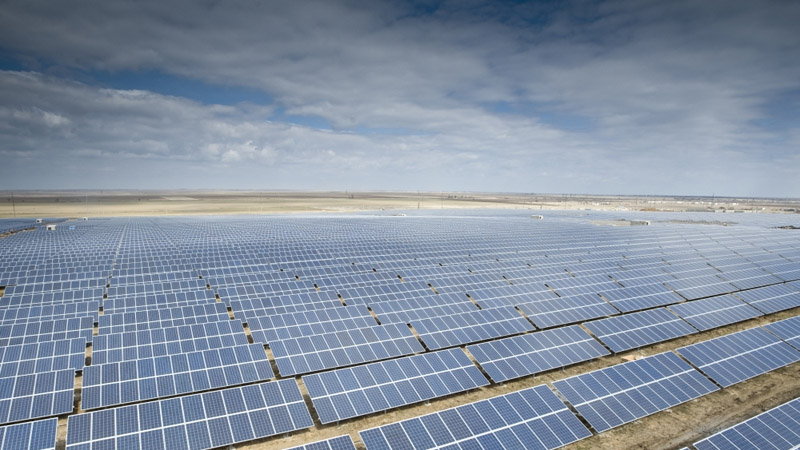China’s installed capacity of solar PV doubled in 2016, according to a National Energy Administration report out on Saturday.
The country now boasts over 77 gigawatts of installed solar PV, up from 34 at the end of 2015.
According to Reuters the provinces that saw the fastest growth were Shandong, Xinjiang and Henan, with Xinjiang, Gansu, Qinghai and Inner Mongolia enjoying highest power capacity.
New climate science war?
Amid fears leading US science institutions may be defunded under Donald Trump’s presidency comes a report claiming global warming figures were exaggerated.
Daily Mail on Sunday reporter David Rose said he had uncovered “astonishing evidence” that data had been manipulated ahead of the 2015 Paris climate conference.
“World leaders were duped into investing billions over manipulated global warming data,” he wrote – pointing the finger at the US National Oceanic and Atmospheric Administration (NOAA).
The truth may be less exciting. According to Carbon Brief, a website specialising in fact-checking, the NOAA figures have been verified by a number of other agencies.
NEW | Factcheck: Mail on Sunday’s ‘astonishing evidence’ about global temperature rise | Guest post by @hausfath https://t.co/e7gGNGxIKc pic.twitter.com/BruRecUo34
— Carbon Brief (@CarbonBrief) February 5, 2017
Rose’s claim that NOAA’s results “can never be verified” is patently incorrect, writes Zeke Hausfather, an analyst at Berkeley Earth, an independent temperature analysis project.
“What he fails to mention is that the new NOAA results have been validated by independent data from satellites, buoys and Argo floats and that many other independent groups, including Berkeley Earth and the UK’s Met Office Hadley Centre, get effectively the same results,” he adds.
The Daily Mail article was corrected midway through Sunday, tweeted Rose, to remedy a “previous inadvertent omission that NOAA and Hadcrut [another data set] use different baselines.”
Trump’s great repeal
Don’t say you weren’t warned. Donald and Republican lawmakers are on the move, laying out plans to scrap laws curbing methane emissions, venting from gas wells and pollution from coal mines.
The push, reports the New York Times, has its genesis in a document sponsored by the Koch Brothers – owners of a vast array of fossil fuel assets.
“The document carried the title ‘A Roadmap to Repeal,’ a concise list of Obama administration environmental regulations that a Koch brothers-backed group was pressing President Trump and Congress to quickly reverse after Inauguration Day. It was a tally of rules that energy industry executives and lobbyists had waged a futile fight against for eight years, donating millions of dollars to lawmakers who vowed to help block them, filing lawsuits to try to overturn them and hiring experts to generate reports that questioned the need for them.”
#GOP wants to gut bipartisan Sec.1504 of #DoddFrank that requires oil, gas, mining co's to disclose payments to foreign governments.
— Ed Markey (@SenMarkey) February 2, 2017
EIU coal report
ICYM – this report by the Economist Intelligence Unit on why coal use in Europe looks terminal is worth a read. Quick take: it’s going, but it will need a hefty policy push out of the door.
Why #coal use is falling in the EU: useful report by @TheEIU https://t.co/iUQ3qq9AUQ pic.twitter.com/ZSR9HcbqPY
— Climate Home News (@ClimateHome) February 2, 2017
Blackrock’s climate warning
Top asset manager Blackrock is weighing in with another climate warning to investors.
“Climate change is an issue of growing importance for clients who are increasingly concerned that they could lose money if they don’t adjust their portfolios to take account of global warming,” Jessica Huang, a member of Blackrock’s impact team told the FT.
Poland’s smog
Warsaw’s hospitals reported a 50% spike in patients during heavy smog episodes last month, reports phys.org.
“In Paris, authorities announce smog alerts and take action when pollution exceeds 80 microgrammes per cubic meter per day. “In Poland, the alert level is 300 microgrammes,” it quotes Piotr Siergiej from the NGO Alarm Smogowy.
Thai govt’s climate report
Thailand has released its second major climate assessment, according to the Bangkok Post:
“A series of research papers in the report showed that every sector will be affected by climate change, including agriculture, fisheries, tourism and healthcare. One study showed that adverse weather will cause a decline in seasonal crops all over the country. Rice, sugar cane and cassava growing areas risk instability in production.”
Australia’s new climate chief
PM Malcolm Turnbull has picked Sid Marris from coal industry lobby group the Minerals Council of Australia as his next climate advisor. Guardian Australia has the story.
New editor
Karl Mathiesen takes over from me as Climate Home editor from the end of this week – he has loads of plans for the site and is keen to hear from our loyal readers. You can drop him a line at [email protected]
